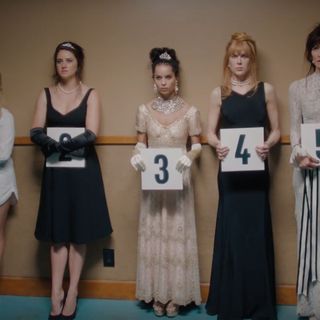
Corporate Investment in Pride Increases Visibility, But Doesn’t Expand Rights
Let’s not kid ourselves about what the rainbow logos are accomplishing.

After Section 377 was scrapped last September, while the LGBTQIA+ community and their allies celebrated, companies like Uber, Zomato, Swiggy, and McDonald’s jumped on the bandwagon and offered rainbow-colored products and unicorn smoothies, capitalizing off the joy of the recently liberated. This sort of profiteering off the LGBTQIA+ community is called ‘pink capitalism.’ Let’s face it, we all shared their advertisements with #loveislove, for it felt good to see the rainbow-colored streets on Uber’s maps, for it felt like belonging.
Truth is, buying a rainbow-colored badge makes you feel like you’re not alone, and a corporate show of solidarity assures the kind of visibility the community desperately needs. I would never argue that companies celebrating a social cause through their products are wrong, but the bitter reality is: sometimes, they’re just after your money. Turning corporate logos pink during June, without implementing hiring policies that are inclusive of the LGBTQIA+ community, or extending active support and assistance to those from the community, is tokenism. Pink capitalism is here and square, and woke India needs to recognize that it is merely a smokescreen for corporations with no pro-LGBTQIA+ policies.
LGBTQIA+ friendly socials — especially bars with ‘Pink Tuesday’ ladies nights, or LGBTQIA+ themed parties — use the community to sell more products and services, while the cities they exist in remain heteronormative spaces. These clubs become ‘straight couples only’ on busy nights, and workplace rights for queer employees are as good as absent. While there are cafés and clubs in the metropolis that specifically cater to the community, they are, by and large, reserved for the affluent. A right to exercise your identity cannot be restricted to those who have money. While brands that recognize queer identities are supremely important — especially because gender performance is inextricably linked with material culture — being queer is more than a lifestyle choice.
Pink money refers to the purchasing power of the LGBTQIA+ community, and it impacts the economy of a country heavily. For example, India was losing around 1.4% of its national output because of Section 377, according to calculations by Lee Badgett, an economics professor at the University of Massachusetts, Amherst, Livemint reported. That means discriminating against the LGBTQIA+ community was costing India around US$26 billion a year.
Related on The Swaddle:
Vatican Issues Manifesto Rejecting Gender Identity as Fluid
Hotel owner Keshav Suri, in an interview with the BBC, talked about the immense purchasing power of the LGBTQIA+ community and its resultant profit. He appealed to the general public to get into the business with the line: “…it is really nothing new, you know. It is just that it is more fabulous, more fun and more scented, and the colors are more fun.”
Imagine a community that is still fighting for rights against workplace harassment, discrimination and prejudice, and for basic health care being seen only for their purchasing power under pink capitalism and their potential to be “fun.”
It has been nine months since decriminalization; it’s June, the month of the original Pride walks held in memory of the Stonewall protests, and we are beginning a new era in India’s socio-economic landscape. While the country is set to be the world’s third-largest consumer economy by 2025, it is also torn apart by liberal policies that fuel the economy, and a conservative culture that glues the nation together.
India’s dichotomy for being liberal and conservative at once is the stuff of legends. Surrounded by more traditional developing countries, India has a reputation for being comparatively liberal; according to a survey by World Values Survey, social acceptance of homosexuality has risen sharply in recent years in India, at a much faster pace than in neighboring countries like China and Pakistan, Livemint reports. Yet, the same Bharatiya Janata Party that in 2015 voted against the introduction of a private member’s bill by Shashi Tharoor to decriminalize homosexuality, is now in power. So, while the government has declined to contest the scrapping of 377, it has clarified that any further rights, like legalizing gay marriage or passing the trans rights bill, will not see the light of day soon.
Avinash Kumar, the head of marketing at consumer goods company Patanjali — one of India’s largest private sector employers — told Reuters via text message the idea of rights for gay employees at the company was a “nonsensical question,” post the 377 ruling. Sanjay Paswan, a member of the Bihar state council and former Indian federal minister who opposed the decision to lift the gay ban, was quoted saying “[Gay] people are suffering from some psychological weakness or problem or trauma. There are very [few] of them in India. I don’t think any lesbians are here,” according to The Guardian.
As of now, gay people in India are currently not allowed to marry, adopt children or inherit their partner’s wealth, should their partner die. They can, however, buy gay-themed smoothies, go to night clubs that have queer nights, and have a large variety of boutiques and cafés that cater to their money, normalizing pink capitalism.
All of these facts align to mean one thing: that support today for the LGBTQIA+ community often is a capitalistic trap. Our government and policymakers would prefer that our cultural lag never catches up and forces real changes for the community; instead, we are blinded by 1,000-rupee rainbow ribbons to soothe our pride and lull us into a sleep of misplaced woke-ness.
While some Pride parades, like the one in Mumbai, are increasingly political and intersectional, there are parts of the country that cannot dream of coming out of the closet, let alone have a Pride walk. And then, of course, there are places where somehow even Pride is trapped in the honeycomb of patriarchal morality. For example, the Pune Pride Committee organized its ninth Pride March on 2 June, and on their Facebook page, they specified a set of guidelines: “Requesting participants to cover their breasts and private parts while dressing. Any political party/caste/ religion/ history character based banners, flags, hoarding, shouting, slogans will not be entertained. Indradhanu Pune pride committee holds all the final rights of pulling down any objectionable content if observed during the pride walk.”
Only in a country as anachronistic as India could you tell someone how to dress for a Pride Walk. Activist Alok Vaid-Menon explains this with a phenomenon they call ‘virtual equality’ — how gay rights movements have achieved visibility without actually obtaining substantive access to power. Virtual equality is a critique of a type of politics that invests heavily on representation — but not in an actual shift in livelihood. What that means is, while the community has achieved unprecedented attention, it is still denied equal access to material reality.
Related on The Swaddle:
Talking With Alok Vaid-Menon About Art, Activism and the Transfeminine Movement
Reuters reported a story about Vyjayanti Vasanta Mogli, who was fired from her job for coming out as trans. Following which she has been searching for a job for months. Leading American and European companies with offices in India routinely invite her to deliver talks about diversity and inclusion; she has not found employment at any of these organizations.
The visibility we get through activism is of no use if it cannot be transformed into everyday basic rights. Dr. Gautam Bhan, a researcher who studies urban poverty and inequality, spent 14 years fighting to decriminalize homosexuality. He spoke in a conference about how urban spaces make it impossible for same-sex couples to own their own house together, start a family and live a normal life. Without legalizing gay marriage, there is no way of realizing the abstract freedom decriminalizing homosexuality gives us into material reality. Even though LGBTQIA+ folks have the freedom to love whoever they want on paper, in reality, they cannot do so.
Ultimately, scrapping Section 377 was just the beginning, because it gives the community much-needed visibility. However, there is a danger that pink capitalism, paraded under consumerism and elitism, gets mistaken for rights. It happened in the West; it happened with marketplace feminism, and there is increasing proof that it is happening here in India.
To quote Alok Vaid-Menon, therefore: “This June I want us to think about the disconnect between a television screen and a back alley. I want us to stop only glorifying the success stories without also naming the prevalence of violence. I want us to recognize how representation does not mean rectification. Representation has and continues to distract us from the reality on the ground. The progressive narrative that it’s somehow getting better for LGBTQ people prevents us from recognizing that this narrative is just that: a story, a fiction, a fairy tale.”
This Pride, therefore, let us walk away from the comforting illusion that the battle for the dignity of the LGBTQIA+ community has been won — for it has only just begun, and it will not end till a separate pink economy stops existing altogether.
Sreemoyee Mukherjee once brought a pen to a gun fight. She used it to rewrite history.
Related


The Swaddle Team Sounds Off on ‘Kabir Singh’ and Misogyny in Film
